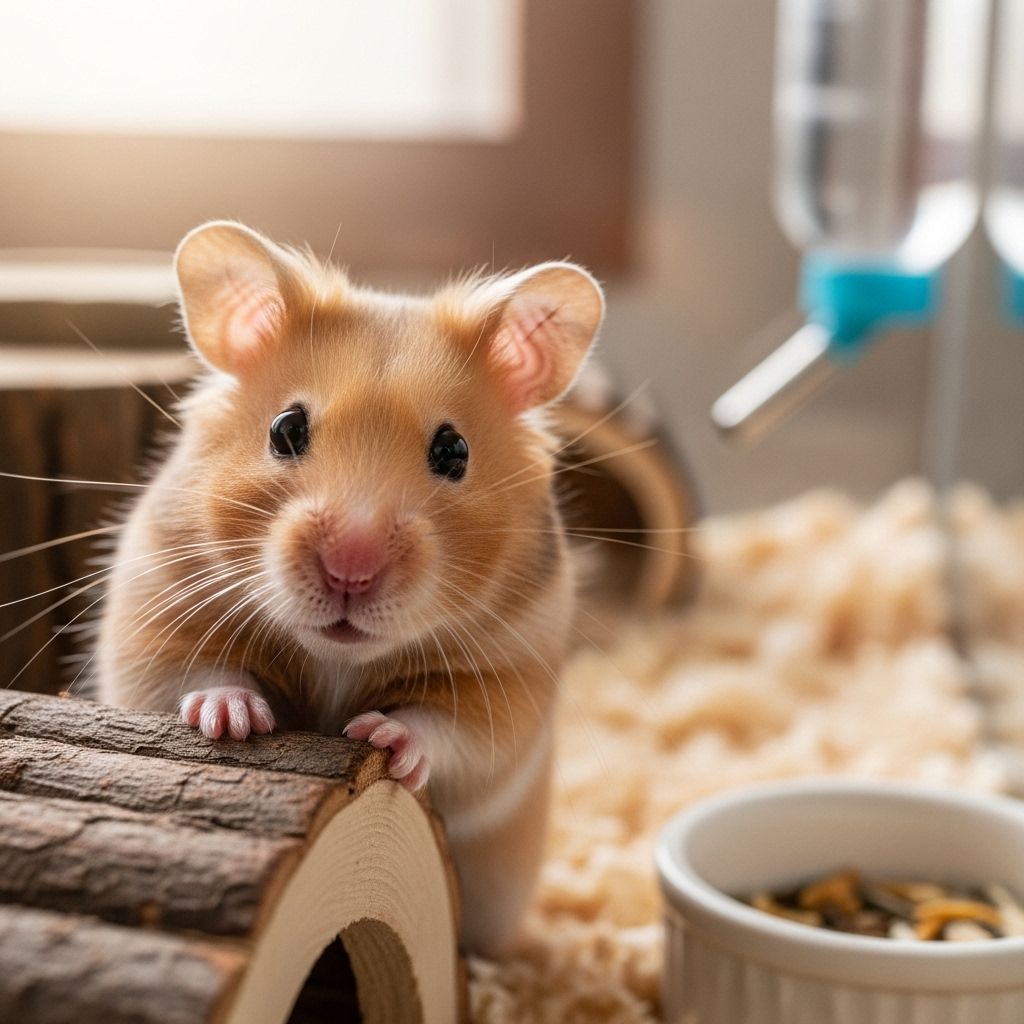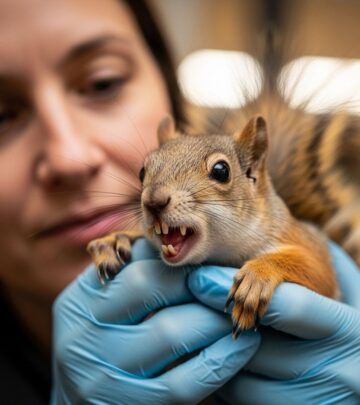Hamster Lifespan: 7 Essential Care Tips For A Longer Life
Discover hidden secrets to extend your tiny pet’s days with expert advice and insights!

Image: HearthJunction Design Team
How Long Do Hamsters Live? Lifespan, Factors, and Care Tips
Hamsters are beloved small pets, cherished for their gentle nature, tiny size, and low maintenance needs. If you are considering a hamster or already have one at home, you may wonder: How long do hamsters live? This comprehensive guide explores their average lifespan, what affects their longevity, and practical advice for helping your hamster live a healthy, fulfilling life.
Hamster Lifespan Overview
Hamsters are relatively short-lived animals compared to many other pets. On average, most pet hamsters live between 18 to 36 months, depending on species, genetics, and the quality of care they receive. While some may live longer, reaching three years or more is less common and generally requires optimal conditions.
- Average lifespan: 1.5 to 3 years
- Most common lifespan: 2 years
- Record longevity: Some rare cases exceed 3 years
Hamster Lifespan by Breed
Different hamster species exhibit varying life expectancies. Understanding these differences can help you set realistic expectations and choose the breed that fits your family best.
| Hamster Species | Average Lifespan | Additional Notes |
|---|---|---|
| Syrian (Golden) Hamster | 1.5 to 3 years | Largest and most popular pet breed; solitary |
| Dwarf Hamsters (Campbell’s, Winter White, Roborovski) | 1.5 to 2 years Some up to 3 years (especially Roborovski) | Smaller in size; some species are more social |
| Chinese Hamster | 2 to 3 years | Distinctive for their longer tails |
Note: The Syrian hamster is often called the “golden hamster” and is the most widely kept breed as a pet. Dwarf hamsters are smaller and can be more active and challenging to handle, especially for young children.
Key Factors Affecting Hamster Lifespan
The lifespan of a hamster depends on several factors. While genetics play a significant role, husbandry and environment are just as important in determining how long a hamster may live.
- Genetics: Some lines of hamsters are more robust than others. Responsible breeding and avoiding inbreeding can boost longevity.
- Species: As noted, some species naturally live a bit longer than others.
- Diet: A well-balanced diet rich in nutrients, with the right mix of seeds, fresh vegetables, and occasional proteins, supports a healthy lifespan.
- Housing: Clean, appropriately sized cages with proper bedding, hiding spots, and enrichment reduce stress and prevent illness.
- Veterinary Care: Routine check-ups, parasite prevention, and prompt treatment of health issues can catch problems early.
- Exercise & Mental Stimulation: Exercise wheels, tunnels, and toys not only fight obesity but also reduce boredom, a major stressor for hamsters.
- Handling & Socialization: Gentle, positive interaction helps tame your pet and reduces injury risk.
Common Causes of Death in Hamsters
Even with excellent care, hamsters are prone to certain health problems that may shorten their lives. Awareness of the common causes of death can help you spot trouble early and seek veterinary intervention.
- Wet Tail (Proliferative Ileitis): A rapidly progressing bacterial infection; leads to diarrhea, dehydration, often fatal if not treated quickly.
- Tumors (Neoplasia): Older hamsters, especially Syrians, are prone to various tumors and lumps.
- Traumatic Injury: Falls or fights with cage mates cause injuries, especially in dwarf hamsters that are kept together.
- Respiratory Issues: Hamsters are sensitive to respiratory infections; drafts, dirty bedding, or dusty environments can be culprits.
- Dental Problems: Overgrown teeth can make eating difficult, impacting nutrition.
- Other: Abdominal masses, skin infections, undiagnosed illnesses, and sometimes sudden unexplained death.
Tips for Helping Your Hamster Live a Long, Healthy Life
- Provide a Balanced Diet: Use a commercial hamster food mix supplemented with fresh veggies (carrot, broccoli, cucumber) and occasional protein (boiled egg, mealworms). Avoid sweets, onion, garlic, and citrus.
- Keep the Cage Clean: Spot-clean daily, change bedding weekly, and fully clean the cage regularly. Provide ample bedding for burrowing and nesting.
- Offer Enrichment: Supply exercise wheels, tunnels, chew toys, and hiding spots to promote physical and mental health.
- Handle Carefully: Approach slowly, avoid waking abruptly, and never squeeze. Supervise children to prevent accidental injury.
- Minimize Stress: Choose a quiet spot for their home, avoid excessive noise and sudden changes.
- Veterinary Visits: Schedule routine health checks and seek immediate care for signs of illness.
- Single vs. Group Housing: Generally, Syrian hamsters should be housed alone, as they are highly territorial and may fight. Some dwarf hamsters can cohabitate, but always monitor for aggression.
Hamster Life Stages: What to Expect
Knowing the key stages of a hamster’s life can help you provide the right care at each juncture:
- Baby (Pup): Born blind and hairless, fully dependent on the mother. Wean at around 3 weeks.
- Juvenile: Rapid growth, learning to explore and eat solid food.
- Adult: Reaches sexual maturity as early as 4-6 weeks. Active, curious, and energetic.
- Senior: From about 18 months onward, activity levels drop. Monitor for tumors, tooth issues, weight changes, and mobility problems.
Factors That Shorten a Hamster’s Lifespan
- Poor Diet: Malnutrition or obesity from inappropriate feeding.
- Unhygienic Living Conditions: Dirty cages promote infections, respiratory disease, and parasites.
- Lack of Exercise: Boredom and obesity lead to health complications.
- Inadequate Veterinary Care: Unaddressed health issues quickly become fatal in small animals.
- Social Stress: Housing incompatible hamsters together can result in fights, injuries, and premature death.
- Genetic Diseases: Some inherited conditions may shorten life regardless of care quality.
Frequently Asked Questions (FAQs)
How long do hamsters usually live?
Most pet hamsters live 1.5 to 3 years, with the majority passing away around age 2. Some rare individuals, especially those of robust breeds like Roborovski or well-cared-for Syrians, may reach 3 years or slightly more.
Which hamster breed lives the longest?
Roborovski dwarf hamsters often have the longest average lifespan, occasionally exceeding three years. However, as individuals, Syrians and Chinese hamsters can also reach the upper limit of 2.5 to 3 years with ideal care.
What are the signs that my hamster is getting old?
- Slowed movements and more frequent sleeping
- Weight loss or changes in eating habits
- Thinning fur or bald patches
- Development of lumps or tumors
- Reduced activity and interest in toys or exercise
How can I help my hamster live longer?
Provide a clean habitat, nutritious diet, ample exercise, gentle handling, routine veterinary care, and minimize environmental stress. Early detection and management of health issues are vital for hamster longevity.
Do hamsters die suddenly?
Sadly, yes. Even apparently healthy hamsters can die suddenly due to congenital issues, hidden disease, or quick-progressing infections like wet tail. Due to their prey animal instincts, hamsters often hide illness until it is advanced.
Should I keep two hamsters together?
Most adult hamsters, particularly Syrians, must be housed alone to prevent serious fighting. Some dwarf hamsters may tolerate same-sex pairs or groups if introduced young, but even they can fight and may require separation.
Conclusion
While hamsters may not live as long as cats or dogs, their short but lively lives can be full of joy and companionship. Understanding their average lifespan, recognizing signs of aging, and committing to excellent care from the outset will ensure your hamster enjoys a safe, stimulating, and loving environment for as long as possible.
By staying informed and attentive, you can maximize both the quantity and quality of time with your furry pocket friend.
References
Read full bio of medha deb












